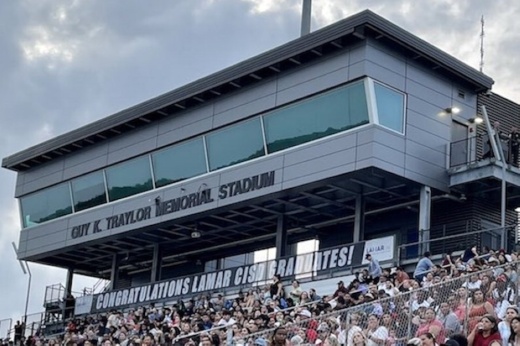Instead, the funds may be redirected toward long-delayed repairs at Traylor Stadium—improvements voters rejected in the November 2023 election. District trustees emphasized the importance of ensuring public understanding of the stadium’s safety needs as the proposal moves forward.
“We’re not trying to put out a Taj Mahal kind of thing,” trustee Zach Lambert said at the June 16 special board meeting. “We want a safe environment for every single student that’s going to touch it, every single staff member, every single participant that’s sitting in the stands.”
What’s changing
While a fine arts facility has been removed from the proposal due to staff concerns regarding costs, Buchanan said Proposition A will still include new primary and secondary school facilities, repairs and replacements.
The proposition presented in May has been split between Proposition B, for technology refreshes, and Proposition C, for 1-to-1 ratio for student laptops, Buchanan said.
Buchanan said the 1-to-1 ratio would ensure equal technology use within the classroom, and the laptops would not be taken home.
Trustee Monica Henderson emphasized the importance of the ratio at the June 17 meeting, noting that tests such as end-of-course exams, State of Texas Assessment of Academic Readiness and unit tests require laptops, and teachers often have to reschedule due to shortages.
Additionally, officials have added Proposition D for repairs at Guy K. Traylor Stadium, Buchanan said, including the replacement of bleachers, disability compliance for the bathrooms and a new scoreboard expected to be completed by August 2028.
Traylor Stadium, which opened in 1960 and serves all six district high schools, and is located at 1000 E. Stadium Drive, Rosenberg, according to the district website.Board President Jacci Hotzel said since voters rejected the $15 million stadium repair proposal in the 2023 bond, the cost of making the repairs has increased, and the district has already reduced the seating capacity.
“The longer we wait to make these [repairs], the more expensive it is going to be every time we go out,” Hotzel said.
While Buchanan also presented the potential to include a $93 million stadium at Terry High School, trustee George Arroyos and several others said the public doesn’t have an “appetite” for a stadium at that price.
The funding
The 2025 bond could be implemented without increasing the district’s current debt service tax rate of $0.48 per $100 valuation for the 2025-26 fiscal year, Chief Financial Officer Jill Ludwig said.
While the ballot language may legally reference a "tax increase," the district's modeling shows the interest and sinking, or debt service, rate can remain steady even with the issuance of a 2025 bond, Ludwig said.
The only situation in which a resident’s tax bill might rise is if their property valuation increases, which is determined by the county appraisal district and not by the school board, Ludwig said.
Arroyos said as rapid development continues in the southern portion district—in areas such as Emberly, Austin Pointe, Brookewater and The George—the resulting property tax revenue from new growth will help fund the debt service, meaning new taxpayers are helping to fund the new facilities.
Moving forward
The district will launch a three-week community survey during the week of June 30 to gather input to inform the potential bond proposal, Chief Communications Officer Sonya Cole-Hamilton said.
The school board is expected to review the survey results and consider calling the bond election at the Aug. 12 board meeting, with the official bond vote scheduled for November, Cole-Hamilton said.





